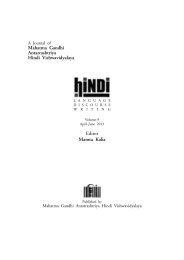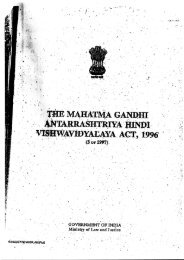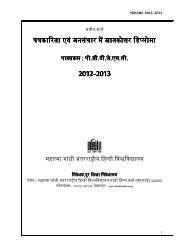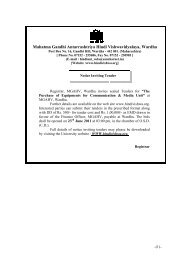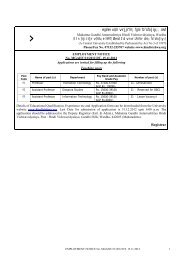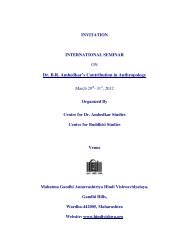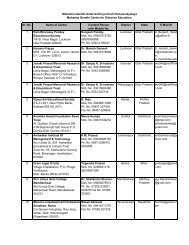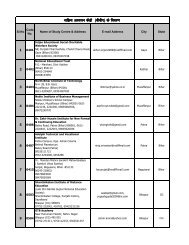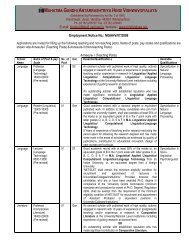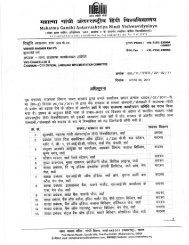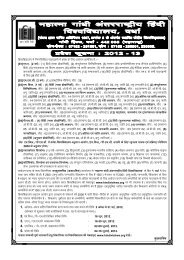Mamta Kalia
Mamta Kalia
Mamta Kalia
You also want an ePaper? Increase the reach of your titles
YUMPU automatically turns print PDFs into web optimized ePapers that Google loves.
(Daniel Bell), or ‘post-modern time’ (C.<br />
Wright Mills) or age of ‘mass culture’<br />
(B.R. Burg). Further there have been<br />
declarations about several types of ends<br />
by social scientists and litterateurs. For<br />
instance, William Hamilton talked of ‘<br />
the radical theory and the death of God’,<br />
(1996), Daniel Bell talked of ‘end of<br />
ideology’, J Derrida talked of ‘end of<br />
man, (1982), F. Fukuyama talked of ‘end<br />
of history and the last man’, (1991) Victor<br />
Vergin talked of ‘end of art’, (1986),<br />
S. Karnan talked of ‘death of literature’<br />
(1990), Rolland Barthes talked of ‘ death<br />
of author’ and Michel Foucault talked<br />
of ‘death of critic’. These declarations<br />
on deaths have some manifest or latent<br />
connections with the post-modernism,<br />
or better to say post-modernity.<br />
In 1960’s, during the period of<br />
‘counter-culture’, post-modernism was<br />
seen as ‘an attitude of counter-culture’<br />
or a new elective and radically<br />
domesticated sensibility of rejecting the<br />
exclusivist and repressive character of<br />
liberal humanism and its institution. In<br />
1970’s, post-modernism entered into the<br />
structuralism, taking inspiration from<br />
Rolland Barthes, Jacques Derrida, Michel<br />
Foucault, Jacques Lacan, Gilles Deleuge<br />
and Felix Guattari. To quote Hans Bertens,<br />
“Like post-structuralism, this postmodernism<br />
rejects the empirical idea<br />
that language can represent reality, that<br />
the world is accessible to us through<br />
language because its objects are mirrored<br />
in the language we use. From this<br />
empirical point of view, language is<br />
transparent, window on the world, and<br />
knowledge arises out of our direct<br />
experience of reality undistorted and<br />
not contaminated by language. Postmodernism<br />
gives up on language’s<br />
representational function and follows<br />
post-structuralism in the idea that<br />
language constitutes, rather than reflects<br />
the world and that knowledge is,<br />
therefore, always distorted by language<br />
that is by the historical circumstances<br />
and the specific environment in which<br />
it arises.” Thus a post-modern subject<br />
is largely other-directed, that is<br />
determined within and constituted by<br />
language.<br />
Subsequently, in late 1970’s and early<br />
1980’s, the post-structuralist modernism<br />
of Barthes and Derrida became linguistic,<br />
i.e., textual in orientation. Their attack<br />
on foundational notions of language,<br />
representation and the subject is<br />
combined with a strong emphasis on<br />
‘ free play’ (Derrida) and ‘inter-textuality’.<br />
According to R Barthes (‘Image-Music-<br />
Text’, 1977), a text, with the ‘death of<br />
author’ is a ‘multidimensional space in<br />
which a variety of writings, none of them<br />
original, blend and clash’. Further a text<br />
is ‘a tissue of quotations drawn from<br />
the innumerable centers of culture’. They<br />
talked of the ‘end of representation’failure<br />
of language to represent anything<br />
outside itself- and death of the subject.<br />
But it gives birth to a problem. To Brenda<br />
K Marshall (‘Teaching the Post-modern:<br />
Fiction and Theory’, 1992), since all the<br />
representations are political in that they<br />
April-June 2010 :: 69



